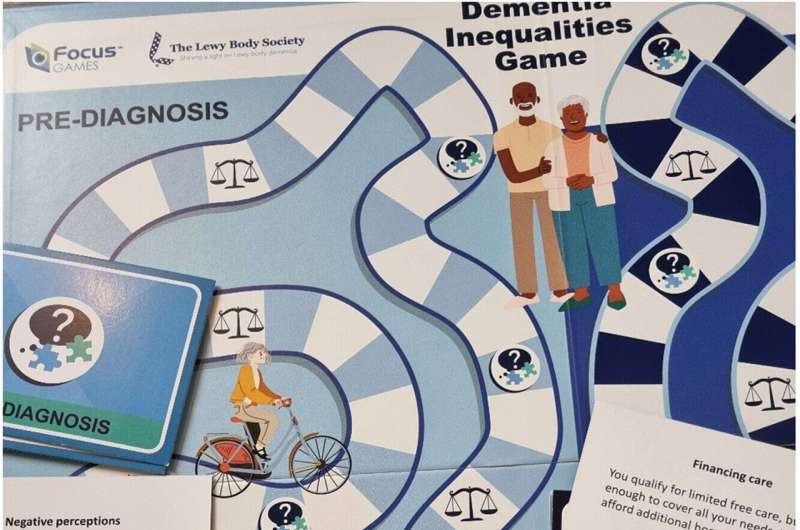This article has been reviewed according to Science X's editorial process and policies. Editors have highlighted the following attributes while ensuring the content's credibility:
fact-checked
trusted source
proofread
Understanding the impact of a dementia board game

Specialist dementia researchers from the University of Liverpool have seen positive initial findings when analyzing the outcomes of a board game that shines a light on dementia inequalities. Their paper, "Co-producing a boardgame to learn and engage about dementia inequalities: First impacts on knowledge in the general population," was published in Health Expectations.
The Dementia Inequalities Game illustrates barriers that people come up against both pre- and post-dementia diagnosis as well as the support available and the positive impact this can have. It's been created by the University of Liverpool, The Lewy Body Society, and third sector representatives in collaboration with people who have lived experience of dementia.
In their recently published paper, Dr. Clarissa Giebel, Senior Research Fellow in the Institute of Population Health at the University of Liverpool outlines how the game was created and its impact so far.
The paper illustrates the game is the first of its kind and fills a necessary and innovative gap to educate people and reach non-academic stakeholders including health and social care professionals, students, and people affected by dementia as well as the general public. Initial users of the game were asked to complete a questionnaire with early indications showing the game does improve knowledge of dementia inequalities.
The roll and move style board game takes players on a journey, illustrating barriers that people come up against as well as the support available. Players can also answer a variety of questions, encouraging teams to consider and discuss issues including the cost of dementia care, and what types of dementia there are including Alzheimer's disease and Lewy body dementia.
Dr. Clarissa Giebel, Senior Research Fellow in the Institute of Population Health at the University of Liverpool and at the NIHR Applied Research Collaboration North West Coast, said, "I'm delighted to see this initial feedback which indicates the game successfully highlights the inequalities and challenges faced before and after a dementia diagnosis.
"One million people are living with dementia in the UK, with numbers continuing to increase. It is one of the main causes of disability later in life, ahead of cancer, cardiovascular disease and stroke. Dementia is a global public health concern, which not only affects the person living with the condition, but also their family members and friends.
"We look forward to further researching the impact of the game."
More information: Clarissa Giebel et al, Co‐producing a board game to learn and engage about dementia inequalities: First impacts on knowledge in the general population, Health Expectations (2024). DOI: 10.1111/hex.13977





















